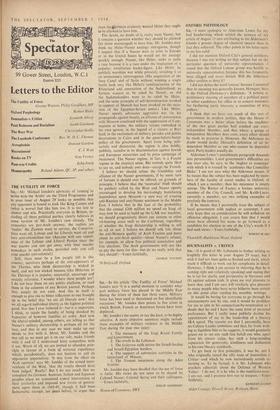Letters to the Editor
The Futility of Force
George Watson, Philip Goodhart, MP
Oxford Psephology Robert Blake Journalists v. Critics Kenneth Allsop Paul Robeson and Racialism Sarah Gainham The Boer War Christopher Hollis The Lambeth Conference Rey. W. D. C. Thomas Acrophobia Duncan Gordon Recruitment C. J. Wait Books on TV Guy Verney Post-war Credits John Irwin Homeopathy Roland Adams, QC, JP, and others
THE FUTILITY OF FORCE
SIR,—Mr. Michael lonides's advocacy of 'coming to terms with the Arabs' on the Third Programme and in your issue of August 29 looks so sensible that any opponent is bound to look like King Canute and (what is worse) feel like him too. It is too late to answer and win. Practically everyone in Britain, in- cluding all three political parties, clearly believes in some version of Mr. Tonides's case already. The romantics arc pro-Arab anyway, the realists arc 'realist.' the Zionists want to survive, the Conserva- tives want oil, Labour and the Liberals want oil and love anti-colonialism too. (Anyone with any experi- ence of the Labour and Liberal Parties since the war knows you can get away with blue murder nowadays in such circles, provided only you call your murder anti-colonial.) Still, there must be a few people left in this country, survivors perhaps of the anti-appeasers of the Thirties, who think dictatorship is wicked in itself, and not less wicked because (like Hitlerism in the Thirties) it is popular, successful, uncorrupt and socially reformist. I wonder where these people are? I do not hear them on any public platform, or read them in the columns of any British journal. Perhaps they simply do not exist. And this in itself is enough to give rise to bitter reflections to one brought up in the belief that 'we are all liberals now,' that we all regard individual liberty as the highest political good. Not that I ever believed it—but it is important,
I think, to retain the faculty of being shocked by hypocrisy of however familiar an order. And now the liberal-minded, among others, arc telling us that Nasser's military dictatorship is perhaps all for the best, and that in any case we must make up our minds to live with it. More, Mr. Tonides and the rest tell us we must get it on our side, make friends with it and (if I Understand him) sympathise with it too. Worst of all, we are invited to abandon prin- ciple in favour of a form of national expediency which, paradoxically, does not hesitate to call its opponents imperialistic. 'It was from the effect on Arab opinion,' says Mr. lonides of the armed inter- ventions of the West, 'that the results should have been judged.' Really? But I do not recall that we consulted the German, Austrian, Italian and Japanese peoples when we committed armed intervention of their territories and imposed new forms of govern- ment upon them in 1943-45; though it had been fashionable enotrgh, ten years before, to argue that since thefermans evidently wanted Hitler they ought to be allowed to have him.
The Arabs, no doubt of it, really want Nasser, but it remains a question whether they should be allowed (let alone encouraged) to have him. Mr. lonides may think my Hitler-Nasser analogy outrageous, though I suspect that if a Nasser were to arise in Europe or in the United States he would see the analogy quickly enough. Nasser, like Hitler, seeks to unite a race because it is a race under the inspiration of a popular, totalitarian leader-figure. Like Hitler, he publicly worships war while privately avoiding it as an unnecessary extravagance. (His acquisition of the Suez Canal and of Syria without winning a single battle look very like Hitler's remilitarisation of the Rhineland and annexation of the Sudetenland; as Syrians wanted to be ruled by Nasser. so did the Sudctenlanders want to be ruled by Hitler, and the same principle of self-determination invoked in support of Munich has been invoked on the occa- sion of the Egyptian-Syrian union.) Like Hitler, Nasser openly advocates aggressive war (in his propaganda against Israel), an alliance of convenience with Moscow combined with the suppression of Com- munism at home, the military virtues embodied in his own person, in the legend of a victory at Port Said, in the excitement of military parades and public decorations in Cairo and in the guns-before-butter policy of his government. Apart from being mili- taristic and dictatorial, the regime is also boldly, publicly, racialist in its discrimination against Jewish and European minorities and its press campaign of incitement. The Nasser regime, in fact, is a Fascist regime in the classical sense. But nobody quite likes to say so, and nobody ever does—except the French.
1 believe we should refuse the friendship and alliance of the Nasser government, if by some turn of fortune it should ever he offered, on grounds of principle. 1 believe that the 'neutralist' bluff should he publicly called by the West and Nasser openly encouraged to develop his increasingly humiliating dependence upon Moscow—a sure way of creating anti-Russian and anti-Nasser sentiment in the Middle East. I believe that in the face of the probability that the annual £200 million we spend on Iraqi oil may now he used to build up the UAR war machine, we should progressively divert our custom to other oil-bearing areas such as the Caribbean, regardless of whether the Iraqi dictatorship is willing to sell us oil or not. 1 believe we should talk less about the anti-Western quality of Arab Fascism and more about its anti-Arab quality—about Nasser's refusal, for example, to allow free political association and free elections. The Arab governments will not like us any the more for this—but do we really wish that they should?—Yours faithfully,


































 Previous page
Previous page